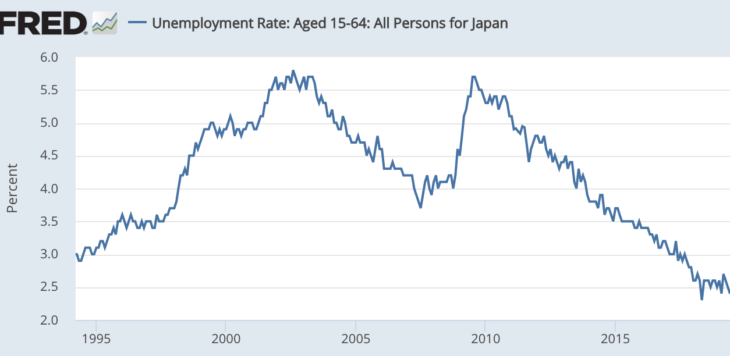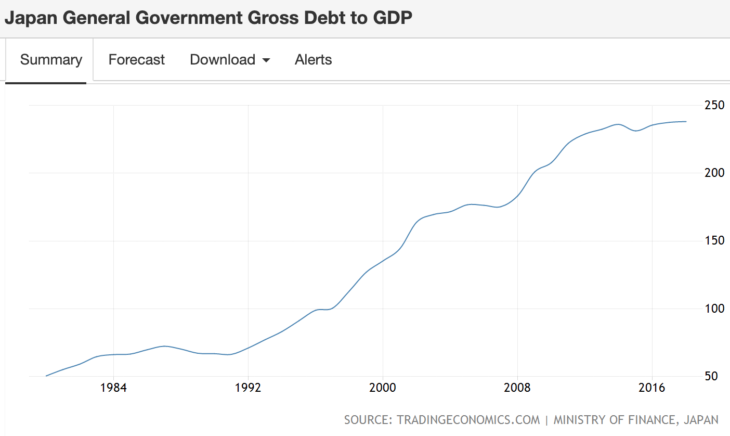
The media tends to dwell on bad news. Even when something is a smashing success, say Germany’s 2004 labor market reforms, the reporting is relentlessly downbeat. The same is true of Japan’s recent fiscal policy, which has finally brought the national debt under control. The debt to GDP ratio has leveled off at roughly 240% of GDP since the 2014 tax increase:

Better yet, this fiscal austerity was associated with an extremely strong labor market, not at all the “disaster” predicted by Keynesian economists:

But that doesn’t stop the media from continuing to insist that the fiscal austerity was a failure. Here’s the Financial Times, discussing the planned October increase in Japan’s national sales tax, from 8% to 10%:
After the disastrous economic impact in 2014, when the tax went up from 5 to 8 per cent, the government has prepared a series of countermeasures.
“Disastrous”? But at least the FT is hedging its bets this time around, as the article is entitled:
Fears recede of Japan recession sparked by consumption tax rise
I’ve been repeatedly insisting that those fears were groundless. That’s not to say a recession cannot occur at some point, but it wouldn’t be caused by fiscal austerity.
The actual policy disaster occurred in 2008, when the Bank of Japan’s tight money policy led to a sharp fall in NGDP. Fiscal policy (and also severe real shocks like the 2011 tsunami) don’t have much impact on employment.

READER COMMENTS
Thaomas
Sep 13 2019 at 6:23am
Do you mean by”austerity” cutting public investment in activities that have NPV>1 when inputs are valued at marginal cost and discounted at the borrowing rate?
Do you agree that in 2017 we should have offset the reduction in business taxes with an increase in progressive consumption taxes and still should?
Scott Sumner
Sep 13 2019 at 10:46am
I define austerity as reducing the budget deficit, or perhaps the cyclically adjusted budget deficit.
And I do support progressive consumption taxes.
Benjamin Cole
Sep 13 2019 at 9:07am
Interesting post. The Japan national debt has leveled out in relation to nominal GDP, although Japan is finally growing its nominal GDP in recent years.
Of course, if one considers the Bank of Japan to be a part of the Japanese national government, then government debt owned by non-government entities in relation to GDP is has been shrinking rapidly.
That is to say, former owners of Japanese government bonds have been paid off with (digitized) cash. Compared to the massive reduction of national debt in relation to national nominal GDP in Japan due to QE, what happens on the fiscal side seems like rather small potatoes.
Matthias Görgens
Sep 13 2019 at 11:47am
Interesting comment!
I was a little surprised you didn’t bring up any connection to central bank financed fiscal programmes?
David S
Sep 14 2019 at 5:12pm
This brings up something that I’ve always wondered about – why is deflation ever an issue?
The solution seems simple, and politically easy – monetize the debt. You could go too far, of course, but surely everyone agrees that if you are facing deflation then monetizing the debt is in everyone’s best interest? Where are these politicians that refuse to increase government spending without raising taxes? Can we get some on loan, or something? 😉
It appears that is what Japan did, and it worked.
Comments are closed.